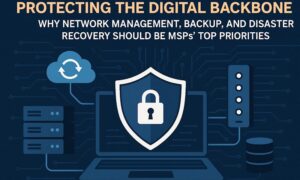In today’s increasingly interconnected world, a dependable and efficient wireless network is an essential part of business operations. Organizations require networks that are fast, secure, and adaptable to the growing number of devices and users. Managed Wi-Fi services are emerging as a viable solution to meet these requirements.
These services, provided by third-party experts, take care of designing, deploying, and managing an organization’s network infrastructure. This offers businesses a way to outsource their complex tasks. This approach has gained traction in recent years as companies realize the benefits it offers over traditional in-house network management.
Managed Wi-Fi: An Overview
Managed wifi refers to a service model where a business outsources the setup and ongoing management of its wireless network to an external provider. Instead of maintaining an in-house team responsible for everything from network configuration to security, companies can turn to a managed service provider (MSP) that handles all technical aspects, including deployment, monitoring, updates, troubleshooting, and performance optimization.
The provider not only sets up the necessary hardware (like access points and switches) but also offers continuous monitoring and support to ensure the network remains stable and secure. This hands-off approach allows businesses to focus on their core operations while ensuring their network needs are met by specialists.
The Advantages of Managed Wi-Fi
- Expertise Without the Overhead
One of the key benefits of Managed Wi-Fi is access to specialized knowledge and expertise without the need for in-house IT specialists. Network management is a complex field that requires deep understanding of hardware, software, security, and troubleshooting. Managed Wi-Fi providers have the necessary skills to handle these tasks efficiently, allowing businesses to avoid the costs and time commitment associated with recruiting and training staff for this role. - Reduced Complexity
Network infrastructure can be intricate, with various components needing to work seamlessly together. Whether it’s integrating the Wi-Fi system with existing wired networks, ensuring proper coverage across a large space, or securing the network from cyber threats, managing all these elements in-house can be overwhelming. Managed Wi-Fi providers simplify the process by offering end-to-end solutions, from planning and deployment to ongoing management. This reduces the operational complexity for businesses and allows them to rely on experts to ensure optimal network performance. - Proactive Monitoring and Issue Resolution
With managed Wi-Fi, organizations benefit from continuous monitoring of their networks. Providers use sophisticated tools to track network traffic, identify bottlenecks, and detect potential issues before they disrupt operations. Whether it’s congestion, connectivity issues, or hardware failure, the provider can address problems quickly—often before they impact users. This proactive approach minimizes downtime and ensures that the network remains efficient and reliable. - Scalability and Flexibility
As businesses grow, so do their network needs. A traditional network setup might struggle to keep pace with expanding employee numbers, new locations, or increased demand on the network. Managed Wi-Fi services offer flexibility to scale up or down as needed. For instance, adding new access points or increasing bandwidth can be done easily, ensuring the network can grow alongside the business. This adaptability allows organizations to meet the demands of both current and future users. - Enhanced Security
Security remains a top concern for organizations, especially as cyber threats become more sophisticated. Managed Wi-Fi providers are well-versed in the latest security best practices, ensuring that the network is protected from both internal and external threats. This can include encryption, secure guest networks, firewall management, and regular security patches to safeguard the network. For many businesses, especially those dealing with sensitive data, the added security provided by an expert is an invaluable benefit. - Cost-Effectiveness
Many businesses hesitate to invest in managed services due to concerns over cost. However, managed Wi-Fi often proves to be more cost-effective than hiring and maintaining an in-house team for network management. Subscription models provide predictable costs, allowing businesses to budget effectively. Additionally, businesses can avoid expensive hardware upgrades or the costs of troubleshooting network issues, as these are handled by the provider.
Emerging Trends in Managed Wi-Fi
The landscape of network management is constantly evolving, with several trends shaping the future of managed wifi solutions:
- AI and Machine Learning Integration
Artificial intelligence (AI) and machine learning are beginning to play a larger role in network management. These technologies can help optimize network performance by predicting traffic patterns, identifying potential issues, and automatically adjusting resources. AI-driven tools can also help enhance security by detecting unusual behavior and quickly responding to threats. - Wi-Fi 6 Adoption
Wi-Fi 6, the latest generation of Wi-Fi technology, promises faster speeds, higher capacity, and better performance in high-density environments. Managed Wi-Fi providers are increasingly adopting Wi-Fi 6 to provide businesses with faster, more efficient networks. As the number of devices in the workplace increases, Wi-Fi 6 will become an essential component of managed Wi-Fi services. - Edge Computing and IoT Integration
As businesses adopt more IoT devices and shift toward edge computing, the demands on Wi-Fi networks are changing. Managed Wi-Fi providers are developing solutions that can handle these new technologies, ensuring that networks can efficiently support a growing number of connected devices and handle data processing closer to the source. - Focus on User Experience
A growing emphasis on user experience (UX) means that managed Wi-Fi services are becoming more user-friendly. Providers are offering more intuitive dashboards, mobile apps for easier management, and better customer support. The aim is to create a more seamless experience for IT teams and end-users alike.
Bottom Line
Managed wifi solutions provide a modern approach to network management that offers businesses a more efficient, scalable, and secure way to handle their wireless connectivity needs.
With emerging technologies like AI, Wi-Fi 6, and IoT integration, the future of managed Wi-Fi looks promising. As businesses continue to grow and become more reliant on wireless networks, managed Wi-Fi services will play an increasingly vital role in supporting their connectivity needs.
For organizations looking to streamline their network management, reduce operational risks, and enhance security, managed Wi-Fi offers a viable solution.



































